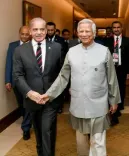Why Did Prateik Chaudhary Decline ‘Kyunki Saas Bhi Kabhi Bahu Thi 2’?

Synopsis
Key Takeaways
- Prateik Chaudhary chose not to join the reboot due to a lack of substantial role.
- The iconic Kyunki Saas Bhi Kabhi Bahu Thi 2 is premiering on July 29.
- Smriti Irani returns as Tulsi Virani in the new season.
- Ekta Kapoor highlights the challenges of competing with nostalgia.
- The show changed the narrative for women in Indian households.
Mumbai, July 22 (NationPress) Actor Prateik Chaudhary has shared insights into his choice to decline the highly anticipated reboot “Kyunki Saas Bhi Kabhi Bahu Thi 2.”
In a heartfelt discussion with IANS, he explained why he decided against participating in the project, despite the excitement surrounding the iconic show's revival. When questioned about his feelings regarding Smriti Irani’s much-awaited return, Prateik remarked, “I am very excited as Smriti Mam is making a comeback. I just hope the audience loves the show as they loved it before.”
The actor also mentioned that he was offered a role in the new season but opted out due to the part not being significant enough and conflicts with his schedule. Consequently, Prateik made the decision to decline the opportunity.
“Yes, I was also offered a part but that was not substantial enough and the date was also not matching, So I said no.”
The eagerly awaited “Kyunki Saas Bhi Kabhi Bahu Thi Season 2” is set to premiere on July 29 on Star Plus. Leading the revival are Smriti Irani, returning in her iconic role as Tulsi Virani, along with Amar Upadhyay, reprising his character Mihir Virani. The new season also features Hiten Tejwani, Gauri Pradhan, Shakti Anand, Kamalika Guha Thakurta, Shagun Sharma, Rohit Suchanti, Aman Gandhi, Ankit Bhatia, and Tanisha Mehta.
Earlier, on July 10, Ekta Kapoor had shared a detailed note on Instagram explaining her initial reluctance to reboot her iconic TV show. An excerpt from her message stated, “Why Kyunki, Why Now? When the 25th year of ‘Kyunki Saas Bhi Kabhi Bahu Thi’ was approaching and the idea of relaunching it surfaced, my first reaction was a firm no! Why would I want to shake up nostalgia?” She elaborated on how nostalgia cannot be competed with and emphasized the evolution of television viewership, noting how audiences now consume content across various platforms.
“Also, the television space has changed. Once dependent on 9 cities, audiences now consume content in fragments, scattered across platforms. Would this shake the legacy of Kyunki, the iconic TRP no one ever achieved before and after?” This legacy, she argued, transcends mere ratings, as research indicated that the show empowered women in Indian households, allowing them to engage in discussions.










